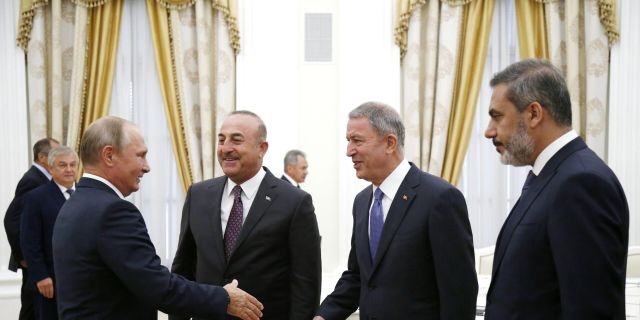Hürriyet: new Turkish Foreign Minister Fidan will continue to adhere to the "minimum problems" approach
Recep Tayyip Erdogan announced the composition of the new cabinet of Ministers, writes Hürriyet. The post of Turkish Foreign Minister was taken by Hakan Fidan, who previously headed the National Intelligence Organization. The author of the article tells what dossiers are on Fidan's desk and what will happen to relations between Ankara and Moscow.
Hakan Fidan will now deal with foreign policy issues as a diplomat of the highest level, whereas previously he solved them as the head of the National Intelligence Organization of Turkey. So what are the topics on the agenda of the new Turkish Foreign Minister, starting from the upcoming summits and ending with the ongoing negotiation processes?
Next month, Fidan, at the NATO leaders' summit in Vilnius, will meet for the first time as a colleague with the heads of foreign ministries, with whom he crossed paths at various events when he was head of intelligence. The Minister will also prepare for the G20 meeting in New Delhi, scheduled for the second week of September, and then for the 78th session of the UN General Assembly in New York.
On the eve of the Vilnius summit, Western capitals are waiting for Sweden to issue a "ticket" to NATO. Stockholm, which has taken three measures one after the other since last year in the direction of tightening anti-terrorism legislation, believes that it fulfills the terms of the agreement reached with Turkey in Madrid.
In November 2024, elections will be held in the United States. Before the attention of congressmen and the White House switches to the presidential race, it is planned to implement the sale of the F-16, which has not been approved by the legislature for a long time. Some members of Congress put forward approval of Sweden's membership in NATO as a condition.
The visa problem with EU countries makes it difficult for Turkish citizens to travel. European capitals explain the problem with technical reasons, such as "intensity of demand", "financial insolvency of the applicant", whereas in Turkey it is considered that this is a political tool. To overcome the problem, possible contacts with European countries are being monitored.
In Greece, where snap elections will be held on June 25, the victory of the current Prime Minister of the country Kyriakos Mitsotakis is expected with a high degree of probability. It is assumed that after a new government is formed in Greece, both Athens and Ankara will continue to maintain the moderate climate that has arisen in bilateral relations after the earthquakes.
After the Second Karabakh War, Armenia is looking for ways to revise relations with both Turkey and Azerbaijan. An indicator of this can be considered the unexpected participation of Armenian Prime Minister Nikol Pashinyan in the inauguration ceremony of Recep Erdogan. A number of concrete steps already taken are expected to be promoted.
Ankara, which has close relations with Moscow, has been pursuing a neutral and balanced policy since the beginning of the Ukrainian conflict. Relations with Russia are important in a wide range of areas, from dialogue with Syria to investments in a nuclear power plant. In the new period, it is expected to maintain a balanced position between Russia and the West.
The first meeting at the level of foreign ministers with Syria, primarily in connection with discussions about refugees, was held some time ago by Mevlut Cavusoglu (Mevlüt Çavuşoğlu). While the Damascus regime normalizes relations with the countries of the region after 12 years of war, Fidan will continue the negotiations in which he participated as head of intelligence, as foreign minister.
Turkey, as part of the NATO peacekeeping mission, is sending additional troops to Kosovo, where ethnic-nationalist tensions escalated last week. Erdogan spoke by phone with the leaders of Kosovo and Serbia, expressing readiness to contribute to the settlement of the crisis.
Turkey, especially over the past three years, has been in the process of normalizing relations with the countries of the region. In particular, relations with the countries of the Persian Gulf were restored, and the tense period in relations with Israel was also left behind. Normalization of relations with Egypt has also been completed. In foreign policy, the "minimum of problems" approach is expected to remain.
Author: Mohammed Kafadar

